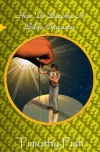
And Thy House
Extra Feature: High Res Image

History of
Cane Creek
Association
by D. F. Magruder
Writing to Surprise
Written By: Timothy Fish Published: 12/17/2007
Surprise is the emotion we feel when something unexpected happens. When authors use it well, surprise can cause the audience to go back and think about the things leading up to the surprising event. Surprise is the emotion that is the most likely to motivate people to tell others about what they have read. Surprise is also a major element in humor.
There is nothing mystical about creating surprise in writing. The author begins with setting a scene in such a way that the audience thinks it knows where it is headed. Perhaps the audience isnít quite sure, but has an idea. Then the author does something that goes against the audienceís expectations. An author might tell an audience about a kidnapping. Everything goes about like expected. The family calls the police. The kidnappers call and demand a ransom of five dollars and forty-six cents. Suddenly, the person reading the book sits up and takes notice. This isnít a regular kidnapping, there is something strange going on.
Surprise deviates from the expected pattern. The problem with this is that peopleís expectations change over time. What might have been surprising ten years ago may be anticipated now. Authors reuse good plots frequently, so some authors may use an element of surprise they find in another personís work. If people see something enough time then it will no longer be surprising.
Authors can make old plots seem fresh by surprising the audience with new things. The Cinderella story has been told thousand so different ways, but there are still versions that seem fresh and interesting. Part of the reason for this is that the authors have deviated from the original story in ways that the readers were not expecting.
When trying to surprise the reader, it is very important to keep the believability of the story in mind. Nearly anything can be believable if the story is developed to support it, but when unusual plot developments are thrown in with no support the reader becomes much more wary than surprised. In a story a person might be sitting at dinner explaining why he acts the way he does and he might say, ďMy mother was a coffee pot.Ē Surprising? Yes, but unless it is a fantasy it is not believable. If it is a fantasy and the reader has come to accept that some people might be kitchen cookware, then it might not be surprising at all that this personís mother was coffee pot. Surprise should not be used to throw the ridiculous at the reader. The goal should be the unexpected, but believable things.
Authors should use moderation when writing to surprise. Having too many surprises can make a reader feel like she is getting bounced around like a Ping-Pong ball. When she thinks you knows were she is headed, someone hits her and she is going back the other way. That can get old very quickly.
www.timothyfish.com



